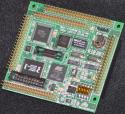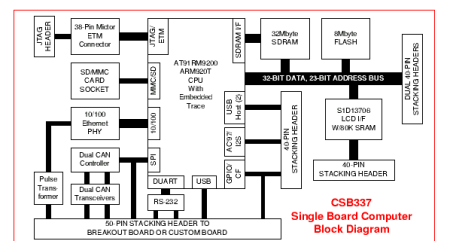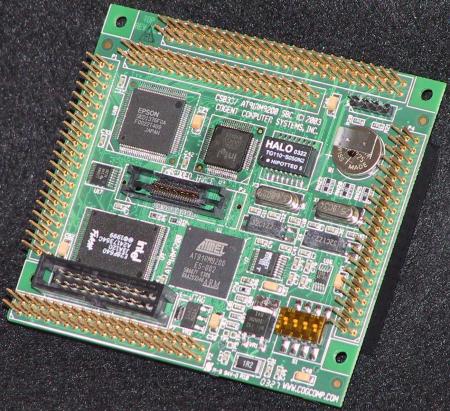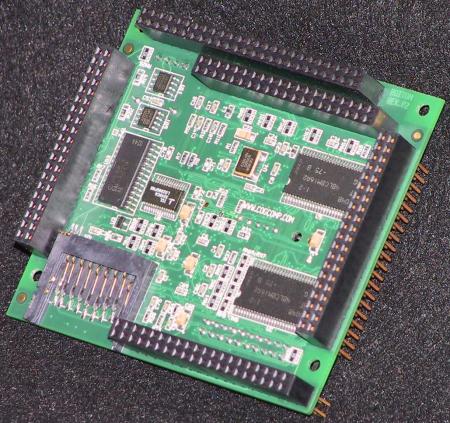Open Source RTEMS BSP for ARM920T SBC
Sep 9, 2003 — by LinuxDevices Staff — from the LinuxDevices Archive — 25 views Cogent Computer Systems Inc. is offering a board support package (BSP) for running the RTEMS open source real-time operating system on its CSB337, a single board computer (SBC) based on the Atmel AT91RM9200 ARM920T system-on-chip (SOC). The BSP supports version 4.6 of the RTEMS OS and is available in full source form with one year of support for $5,995.
Cogent Computer Systems Inc. is offering a board support package (BSP) for running the RTEMS open source real-time operating system on its CSB337, a single board computer (SBC) based on the Atmel AT91RM9200 ARM920T system-on-chip (SOC). The BSP supports version 4.6 of the RTEMS OS and is available in full source form with one year of support for $5,995.
RTEMS, a real-time kernel, provides a high performance environment for embedded applications development, according to Cogent.
Overall features of the BSP listed by Cogent include:
- Standards Compliant, POSIX 1003.1b API including threads and RTEID/ORKID based Classic API (similar to pSOS+)
- High performance port of FreeBSD TCP/IP stack
- Debugging via GNU debugger (gdb) and DDD GUI interface to GDB that is thread aware, debug over Ethernet or Serial Port
- Filesystem Support, In-Memory Filesystem (IMFS), TFTP Client Filesystem, MS-DOS FAT32, FAT16, and FAT12 and NFS client
Kernel features of RTEMS listed by Cogent include:
- multitasking capabilities
- event-driven, priority-based, preemptive scheduling
- optional rate monotonic scheduling
- intertask communication and synchronization
- priority inheritance
- responsive interrupt management
- dynamic memory allocation
- high level of user configurability
RTEMS is complimented by the highly regarded FreeBSD TCP/IP stack, says Cogent, which supports the well-known sockets interface.
Cogent lists the following supported FreeBSD stack protocols:
- UDP, TCP, ICMP, DHCP, RARP, BOOTP, PPPD
- Client Services include:
- Domain Name Service (DNS) client
- Trivial FTP (TFTP) client
- Network Filesystem System (NFS) client
- Servers include:
- FTP server (FTPD)
- Web Server (HTTPD)
- Telnet Server (TELNETD)
- Sun Remote Procedure Call (RPC)
- Sun eXternal Data Representation (XDR)
- CORBA
The CSB337 RTEMS ports support the serial console I/O, the real-time clock, OS and general purpose timers and Ethernet I/O, according to Cogent. Future releases will provide support for: CAN I/O (low level library only); LCD Controller (low level graphics library); and MS-DOS filesystem via compact flash and SD/MMC card socket.

Cogent CSB337 AT91RM9200-based SBC
Click for larger view
Cogent lists the following features for its CSB337 :
- 180Mhz ARM920T, 16K I-Cache, 16K D-Cache
- 32Mbyte 32-Bit Wide SDRAM
- 8Mbyte 16-Bit Wide StrataFLASH
- Secure Digital Card via 4-Bit SDIO Controller
- Epson S1D13706 with 80KByte SRAM supports up to 320×240 TFT, HR-TFT and STN LCD Displays
- One USB V1.1 Device Port
- Two USB V1.1 Host ports available via GPIO Expansion Connector
- Dual RS232 Serial – Two additional UARTS (TTL only) available via the GPIO Expansion Connector
- Infineon SAK82C900 Dual CAN Controller via SPI
- On-Chip 10/100 Mbit Controller with DMA
- Dallas DS1307 RTC With Battery
- Full CPU Bus and GPIO available via 40-Pin stackable headers
- AC'97 Interface via GPIO Expansion Connector (Compatible with the AC'97 Codec on the CSB301 Breakout Board)
- Compact Flash Interface via GPIO, Address and Data Bus Expansion Connectors (Compatible with CSB301)
- 20-Pin Header and 38-Pin, High-Speed, Embedded Trace Module Connector (16-Bit)
- Three GPIO for LED Control via Expansion Header
- Three GPIO for User Switches from Expansion Header
- 5V Only Connection
A Breakout Board, such as the CSB300, or CSB301 allows for standalone operation. Using the CSB301 also allows use of the AC'97 and Compact Flash Interfaces. Additionally, the CSB301 contains a 5.7″ Color LCD with Touch Screen and Dual RS485 for the AT91RM9200 additional UARTS. CSB301 is sold seperately.

Cogent CSB337, top view

Cogent CSB337, bottom view
This article was originally published on LinuxDevices.com and has been donated to the open source community by QuinStreet Inc. Please visit LinuxToday.com for up-to-date news and articles about Linux and open source.